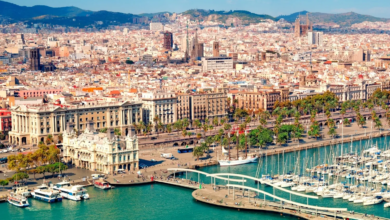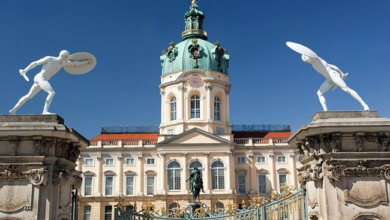The most important tourist attractions in North Korea

ons that are open to visitors with special permits and under strict government supervision. Here are a few of them:
- Kumsusan Palace of the Sun: This is a mausoleum located in Pyongyang that houses the embalmed bodies of former North Korean leaders Kim Il-sung and Kim Jong-il. Visitors are required to wear formal attire and follow strict protocol when visiting the site.
- Korean Demilitarized Zone (DMZ): This is the heavily guarded zone that separates North and South Korea. Visitors can take a guided tour of the area from the North Korean side and learn about the history and politics of the Korean Peninsula.
- Juche Tower: This is a 170-meter tower located in Pyongyang that symbolizes the Juche ideology, which is the official state ideology of North Korea. Visitors can climb to the top for panoramic views of the city.
- International Friendship Exhibition: This is a museum located in Myohyangsan that houses gifts given to North Korean leaders from foreign dignitaries. Visitors can browse the extensive collection of gifts, including artwork, jewelry, and other unique items.
- Mount Kumgang: This is a mountain range located near the North Korean border with South Korea that is known for its natural beauty and scenic views. Visitors can take a guided tour of the area and enjoy hiking, rock climbing, and other outdoor activities

It’s important to note that travel to North Korea is highly controlled by the government and visitors are required to follow strict rules and regulations. Visitors are also accompanied by government guides at all times and are not allowed to freely explore the country on their own.
S more tourist attractions in North Korea that are open to visitors:
- Ryugyong Hotel: This is a massive, pyramid-shaped hotel located in Pyongyang that has become a symbol of the city. Visitors can take a guided tour of the exterior of the building and learn about its history and construction.
- Mangyongdae Revolutionary Museum: This is a museum located in Pyongyang that celebrates the life and accomplishments of North Korean founder Kim Il-sung. Visitors can explore the museum’s exhibits and learn about Kim Il-sung’s role in North Korean history.
- Arch of Triumph: This is a monument located in Pyongyang that was built to commemorate North Korea’s resistance against Japan during World War II. Visitors can take a guided tour of the monument and learn about its significance.
- Paektu Mountain: This is a sacred mountain located on the border of North Korea and China that is known for its natural beauty and historical significance. Visitors can take a guided tour of the area and learn about the mountain’s role in North Korean mythology and history.
- Moranbong Park: This is a public park located in Pyongyang that is known for its beautiful scenery and outdoor activities. Visitors can enjoy walking and picnicking in the park, as well as riding boats on the lake.
It’s important to note that travel to North Korea is highly restricted and visitors are required to follow strict rules and regulations. Visitors are also accompanied by government guides at all times and are not allowed to freely explore the country on their own. It’s also important to consider the ethical implications of tourism in North Korea, as the country has been criticized for human rights abuses and political repression.

some additional facts about North Korea:
- North Korea is officially known as the Democratic People’s Republic of Korea (DPRK) and is a one-party state with the Workers’ Party of Korea as the ruling party.
- The capital and largest city of North Korea is Pyongyang, which is home to over 3 million people.
- North Korea is one of the most isolated and secretive countries in the world, with limited access to outside information and strict control over the media.
- The official language of North Korea is Korean, and the country uses the same Hangeul alphabet as South Korea.
- North Korea has a heavily militarized society and is known for its large standing army and nuclear weapons program.
- North Korea has a planned economy that is largely controlled by the government, with limited private enterprise and foreign investment.
- North Korea has a unique socialist ideology known as Juche, which emphasizes self-reliance and independence from outside influence.
- North Korea has a limited tourism industry that is largely controlled by the government, with visitors required to follow strict rules and regulations.
- North Korea has a rich cultural heritage that is preserved through its traditional arts, music, dance, and literature.
- North Korean cuisine includes dishes such as kimchi, rice, noodles, and meat dishes, as well as unique specialties such as dog meat and North Korean-style cold noodles.
It’s important to note that North Korea is a politically isolated and heavily controlled country, and visiting the country as a tourist can have ethical implications. Visitors are required to follow strict rules and regulations and are accompanied by government guides at all times.
are some additional facts about North Korea:
- North Korea has a unique calendar system known as the Juche calendar, which is based on the year of Kim Il-sung’s birth in 1912. The year 2021 in the Juche calendar is 110.
- North Korea has a state-run education system that emphasizes the study of Juche ideology and the teachings of its leaders.
- North Korea has a limited internet infrastructure and restricts access to outside information, with only a small portion of the population having access to the internet.
- North Korea has a unique fashion style that emphasizes conservative dress and modesty, with official guidelines on acceptable clothing styles and colors.
- North Korea has a large number of monuments and statues dedicated to its leaders and revolutionary heroes, including the 22-meter tall statue of Kim Il-sung in Pyongyang.
- North Korea has a large number of labor camps and prisons, where political dissidents, religious minorities, and others deemed to be a threat to the government are held under harsh conditions.
- North Korea has a unique sports culture that emphasizes collective effort and teamwork, with sports such as soccer, basketball, and weightlifting being popular.
- North Korea has a limited transportation infrastructure, with most travel taking place via trains or buses.
- North Korea has a unique system of classifying its citizens, with each person assigned a social status based on their family background, occupation, and political loyalty.
- North Korea has a limited healthcare system that is largely focused on preventive medicine, with traditional Korean medicine also used alongside modern medical practices.
It’s important to note that North Korea is a politically isolated and heavily controlled country, and visiting the country as a tourist can have ethical implications. Visitors are required to follow strict rules and regulations and are accompanied by government guides at all times.
some additional facts about North Korea:
- North Korea has a system of mass mobilization known as the “all-people’s movement,” which involves the participation of all citizens in a variety of activities, such as farming, construction, and military training.
- North Korea has a unique film industry that produces propaganda films as well as a limited number of commercial films.
- North Korea has a limited electricity supply, with power outages being common in many parts of the country.
- North Korea has a unique form of urban planning that emphasizes symmetry and grandiose architecture, with many buildings featuring large murals and socialist realist artwork.
- North Korea has a strict dress code for women, with traditional Korean clothing such as the hanbok being preferred over Western-style clothing.
- North Korea has a limited number of foreign embassies and maintains diplomatic relations with a select number of countries, including China and Russia.
- North Korea has a unique form of public transportation known as the “trolley bus,” which operates on electric power and is a common sight in cities such as Pyongyang.
- North Korea has a limited number of newspapers and other media outlets, all of which are controlled by the government.
- North Korea has a unique form of currency known as the North Korean won, which is not traded on international currency markets.
- North Korea has a limited number of food options, with the government controlling the distribution of food and rationing supplies during times of scarcity.

It’s important to note that North Korea is a politically isolated and heavily controlled country, and visiting the country as a tourist can have ethical implications. Visitors are required to follow strict rules and regulations and are accompanied by government guides at all times.
are some additional facts about North Korea:
- North Korea has a state-run media system that controls all forms of communication within the country, including television, radio, and the internet.
- North Korea is one of the most ethnically homogeneous countries in the world, with over 99% of the population being of Korean ethnicity.
- North Korea has a unique form of architecture that emphasizes grandiose and monumental designs, with many buildings featuring large murals and socialist realist artwork.
- North Korea has a large number of military parades and celebrations, which are often used to showcase the country’s military might and ideological principles.
- North Korea has a unique system of government that combines elements of communism, socialism, and authoritarianism.
- North Korea has a limited number of foreign visitors, with most tour groups being organized through state-run travel agencies.
- North Korea has a unique system of outdoor exercise equipment, which is found in many public parks and is used for collective exercise sessions.
- North Korea has a large number of underground facilities, including tunnels and bunkers, which are used for military and strategic purposes.
- North Korea has a unique form of art known as the “revolutionary opera,” which combines elements of traditional Korean music with revolutionary themes.
- North Korea has a limited number of trade partners and relies heavily on China for economic and political support.
It’s important to note that North Korea is a politically isolated and heavily controlled country, and visiting the country as a tourist can have ethical implications. Visitors are required to follow strict rules and regulations and are accompanied by government guides at all times.
Certainly, here are some additional facts about North Korea:
- North Korea has a unique system of healthcare that prioritizes preventive medicine and traditional Korean medicine.
- North Korea has a limited number of hotels, with most visitors staying in government-run accommodations.
- North Korea has a unique form of dance known as the “mass dance,” which involves large groups of people performing synchronized dance routines.
- North Korea has a state-run airline, Air Koryo, which operates a limited number of international flights to countries such as China, Russia, and Cambodia.
- North Korea has a large number of propaganda posters, which are displayed throughout the country and feature slogans promoting the ideology of the ruling party.
- North Korea has a unique form of martial art known as Taekwondo, which is also practiced in South Korea and around the world.
- North Korea has a limited number of universities and colleges, all of which are controlled by the government.
- North Korea has a unique form of public transportation known as the “victory bus,” which is a large, Soviet-style bus that is used for mass transportation.
- North Korea has a large number of museums and monuments dedicated to its military history and revolutionary struggles.
- North Korea has a unique form of cuisine that emphasizes simple, hearty dishes such as rice, stews, and soups, as well as fermented foods such as kimchi.
It’s important to note that North Korea is a politically isolated and heavily controlled country, and visiting the country as a tourist can have ethical implications. Visitors are required to follow strict rules and regulations and are accompanied by government guides at all times.



